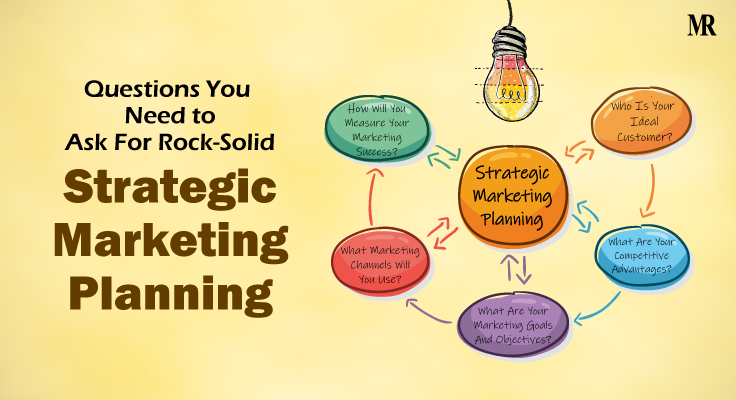Strategic marketing planning has the potential to make or break the success of the company! But before you get this into your business, it is very important to ask yourself and your team the right questions.
Indeed, these questions will not only save lots of your efforts and time but also save you from disastrous loss. In this blog, you will come across 5 such questions that you should know the answer to before investing in marketing. So, let’s quickly start our journey toward success!
Strategic Marketing Planning And Its Importance
Strategic Marketing Planning is the process of creating a plan acting like a mindmap to outperform your competitors. Well, this helps you stand out from the rest by marking your extraordinary presence in the market.
Strategic marketing planning is of great importance to the company. As it enables a long-term view of the company. It helps in predicting the changes in the industry and developing innovative strategies. Additionally, it allows you to stay ahead of your competitors by understanding the market dynamics and the needs of the target audience.
Indeed, it also ensures the allocation of resources. And, it helps to set budgets, understand personnel, and use technology effectively. So, this way the firm can actually focus on high-impact activities to meet the goals. This also helps in building a strong bond with the customers by delivering them value beyond expectation. Therefore, strategic marketing planning helps in outperforming the competitors with proper positioning.
Therefore, we all know strategic marketing planning involves analyzing the market trends, researching, understanding the needs of customers, knowing the competition, and many more. So, Now let’s know about the 5 most important questions you need to ask before strategic marketing planning!
1. Who Is Your Ideal Customer?
Identifying your ideal customer is one of the most important things to keep in mind while working on strategic marketing planning. Well, it helps to identify the characteristics of your ideal audience who are most likely to engage with your product or service and also benefit from it.
Understanding your target audience will for sure allow you to make more personalized and effective marketing strategies. So, this way your marketing efforts are actually focused on converting the people into potential customers. This helps you to improve your budget and resource efficiency as well.
Creating a detailed buyer persona helps a lot in strategic marketing planning. It’s like knowing your ideal audience based on real data and insights. You can gather the required information through research, surveys, and by interviewing your existing customers, or other prospects outside your contact list.
Indeed, this way you reach people who align with your target audience. Demographic data like age, gender, education, income, and places where they come from can tell you a lot about your client. Actually, psychological attributes like interests, attitudes, lifestyles, and values matter a lot in strategic marketing planning. Additionally, behavioral aspects like purchase history and brand interactions say a lot about the behavior relating to your products and services helping you in strategic marketing planning.
2. What Are Your Competitive Advantages?
Strategic marketing planning helps in identifying competitive advantages like identifying what your business does better than anyone else in the market. This concerns analyzing your strengths and deciding how you can outshine your competition.
So, to identify your unique selling proposition (USP) have a keen look at the features and benefits of your product and services. Then try understanding your audience and what they value. Later improve your product or services making it unique.
Something equally important and cannot be missed is competitor analysis! This involves collecting data about your competitors to help you recognize their strengths and weaknesses. Indeed, this enables you to identify areas where you can excel. Also, conducting a SWOT analysis of both your company and the competitor will allow you to succeed with good strategic marketing planning.
3. What Are Your Marketing Goals And Objectives?
We all know that the goals are the broader targets to achieve. Objectives are the specific steps that help us achieve our goals. Every company here should follow SMART criteria which means, Specific, Measurable, Achievable, Relevant, and Time-bound.
For example, if the goal here is to be the leader in your market then the objective to support that goal should be increasing the market share by 10% within the upcoming year. Well, goals and objectives are so closely linked but are still different aspects of a firm.
Indeed, common marketing goals are very important in strategic marketing planning. This includes brand awareness which comprises of making people aware of your brand. Followed by the lead generation! This comprises attracting potential customers who may be interested in your products or services. Later comes the sales! A part of converting leads into actual revenue.
Setting measurable and achievable objectives is important in strategic marketing planning. The objectives should be quantifiable like a percentage increase in website traffic or a particular number of new leads per month. Considering the market conditions the objectives should be realistic.
4. What Marketing Channels Will You Use?
The significance of selecting the right marketing channels for your audience cannot just be defined in words. They play an important role through different communication channels. Different audiences prefer different communication channels so choose what resonates with them keeping in mind their demographics and psychographics.
Social media marketing platforms like Facebook, Instagram, Twitter, LinkedIn, and Interest are great for brand promotions and advertising. Choose them based on their demographics and behavior. Each marketing channel requires time, effort, and sometimes financial investments. So select the right medium for reaching your customers with the right resource optimization. Always remember the right channels will encourage engagement. And they will take desired actions only when they can interact with the brand through their preferred channels.
The value and relevance of content marketing like blogs, videos, and infographics create a huge impact on people. Additionally, Email campaigns allow direct contact with your audience. SEO improves the visibility of the website understanding your audience’s search behavior resulting in an easy target audience. Pay-per-click (PPC) ads on platforms like Google Ads or social media can drive targeted traffic. Moreover, influencer marketing also does a great job of boosting your brand credibility.
5. How Will You Measure Your Marketing Success?
The importance of tracking and measuring marketing performance is an essential task that helps you with actionable insights. It also allows you to optimize strategies and stay on track. Well, it also enables you to understand the customer’s journey with your product or service. By tracking intermediate metrics you can have better control over your business adjustments.
Key Performance Indicators (KPIs) for different marketing goals may include the following.
- Market Share: This shows the percentage of the market captured by your company. Sometimes, a high market share indicates dominance.
- Sales Revenue: This indicates the value of total goods or services sold. The sales revenue also reflects the health and growth of the business.
- Conversion Rate: The percentage of visitors who took action. High conversion rates mean effective targeting and great content.
- Brand Equity: The value associated with your brand leads to customer loyalty and trust.
- Bounce Rate: Percentage of visitors who leave your website very soon. Low bounce rates indicate engaging content.
- Cost Per Click (CPC): The cost of each click on your online ads leads to efficient ad spending.
End Note
As we conclude, we realize that strategic marketing planning plays an important role in achieving business goals. Just asking the right questions before starting the marketing journey can make all the difference in your business world.
By focusing on these questions you will be better prepared to create a wonderful marketing strategy that also resonates with your ideal audience and gives desired results. So, are you ready to take your business to the next level? If yes, let’s quickly take action by creating a strategic marketing plan with these questions today!
Also Read: Are you making these 5 B2B Marketing Mistakes? Here’s how to fix them!












